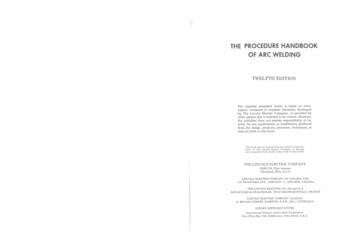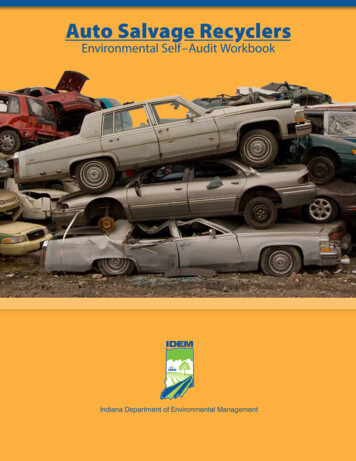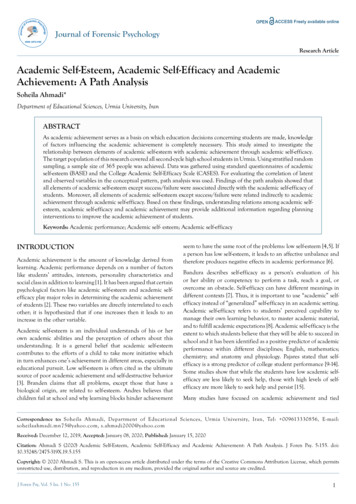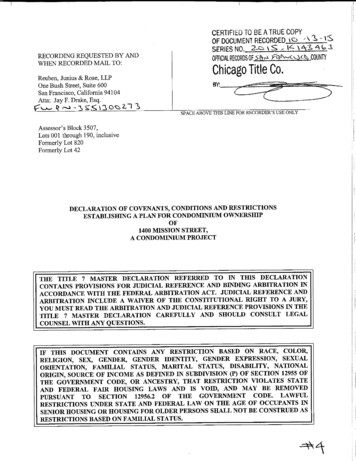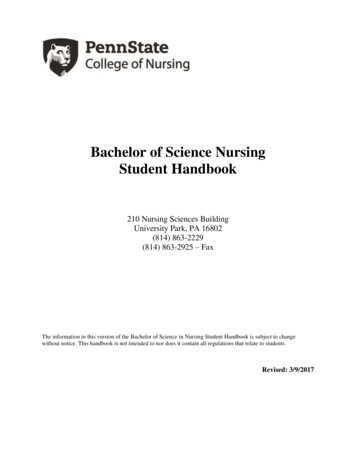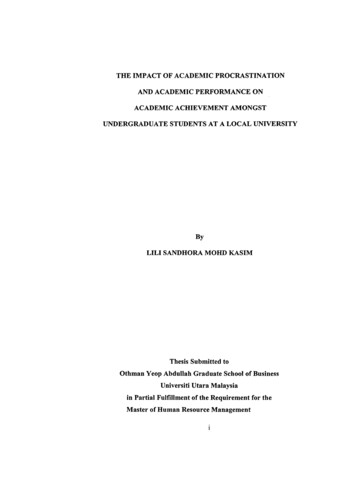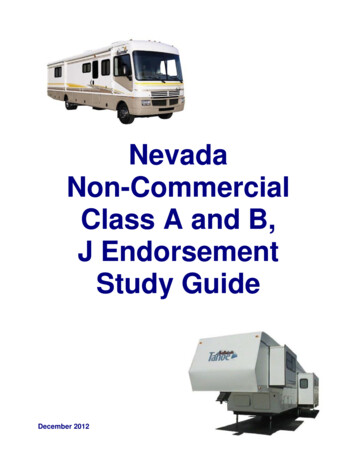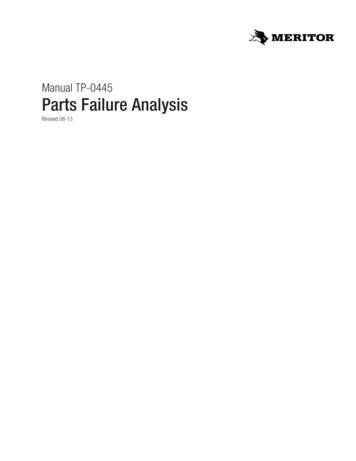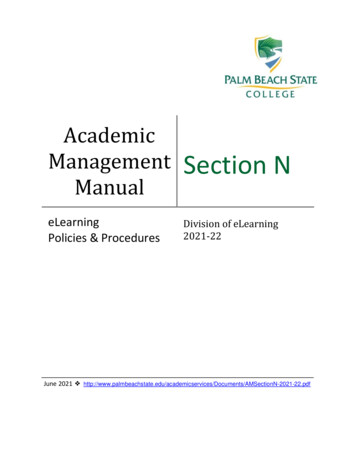
Transcription
AcademicManagementManualeLearningPolicies & ProceduresSection NDivision of eLearning2021-22June 2021 uments/AMSectionN-2021-22.pdf
Section N – eLearning Policies & Procedures 2021-22Table of ContentsGeneral Information .N-1eLearning Delivery Systems .N-3eLearning Course Design and Development.N-3eLearning Certification Policies and Certification Guidelines.N-4Course Certification Criteria .N-5Online Course Template Development (Department/Cluster Owned Templates) .N-7Canvas Training & Faculty Development .N-9General eLearning Policies and Guidelines.N-10Student Support Services/Information and eLearning.N-13Workday Coding for eLearning Courses .N-15June 2021i
Section N – eLearning Policies & Procedures 2021-22General InformationeLearning Department and Mission StatementsOffice of Distance LearningManages the Learning Management System (Canvas), provides assistance with online coursedevelopment, ensures quality of distance learning course structure and delivery, and providesCanvas faculty development/training materials.Mission Statement: To provide students an opportunity to learn in an environment which bestmeets their varied lifestyles, offering quality credit and non-credit courses, degrees andcertifications by distance learning in order to provide opportunities for students that cannotattend traditional courses to complete their education remotely.Canvas Student Success and Support CentereLearning provides student assistance with the Learning Management System (Canvas),investigates student reported problems with course material delivery, and assists students withlearning online effectively. The department offers the ELO1000 course - a self-paced, nongraded, no-cost online orientation that provides students the opportunity to experience what anonline course is like, the opportunity to learn how to use the Canvas Learning ManagementSystem and provides helpful tips on how to succeed in distance education classes. It isrecommended students complete this orientation within the first two days of the term. Thisorientation takes approximately only 4 hours to complete.Mission Statement: To promote student success in online courses by preparing students to learnonline, assisting with course navigation, troubleshooting technical issues related to onlinecourses and provide student Canvas training/orientation.What is eLearning?eLearning includes classes that utilize a learning [course] management system (LMS) to assistwith instruction or present classes fully online. eLearning also supports the integration oftechnology in the learning environment, use of the Internet as a resource in the classroom,email, compressed/stream video, Web conferencing and other instructional technologies.Palm Beach State College offers eLearning classes in both credit and non-credit areas thatrequire few (if any) on-campus meetings. Classes are designed to provide close interaction withinstructors while also allowing greater time and space flexibility to serve the students' needs.Use of course-mail, discussion boards, synchronous online chat rooms, blogs, wikis, Webconferencing, and face-to-face meetings occur to encourage effective communication withstudents and instructor or student-to-student interaction. These courses are rigorous and coverthe same material as on-campus classes. Credits earned though eLearning course work aretransferable and appear on transcripts just like any other class.Organizational InformationThe eLearning Director supervises the Department and reports directly to the Vice President ofAcademic Innovation and Strategy at Palm Beach State College. The eLearning AdvisoryCommittee provides opportunities for faculty/instructors and staff to discuss pertinenteLearning issues and offer guidance to maintain a quality program.June 2021N-1
Section N – eLearning Policies & Procedures 2021-22Quality of CoursesThe course name and number of eLearning courses shall be the same as traditional in-classcourses. The course goals and objectives, learning outcomes and the time frame for completionof all instructional activities will also be equivalent to the traditional in-class courses.CurriculumAcademic Services maintains course outlines for the courses offered at Palm Beach State ourseOutlines). From these course outlines,faculty/instructors create individual class syllabus. The course outlines are continuously updatedthrough curriculum actions and State Course Numbering System transactions. eLearning classesuse the same course outline as face-to-face classes.Southern Association of Colleges and Schools – Commission on Colleges (SACS-COC) Criteria:"The Commission recognizes the legitimacy of distance learning, such as that conveyed throughoff-campus classroom programs, external degree programs, branch campuses, correspondencecourses and various programs using electronically based instruction offered geographicallydistant from the main campus."In 2001, Palm Beach State College (PBSC) was approved to offer eLearning (distance learning) bySACS-COC through a substantive change. In 2012 SACS-COC reaffirmed PBSC accreditation.eLearning Goals: To provide an alternative education delivery system for greater access by our students; To provide flexibility of time and location; To promote the integration of technology in the learning environment; To promote globalization of education through electronic access to information andexperts worldwide; To ensure quality of online course structure and delivery; To ensure student LMS (Canvas) readiness and provide online student support; To provide faculty, instructors and supporting staff continuous quality training andtechnical support.Who are Palm Beach State College’s eLearners?eLearning courses and programs at PBSC serve students in the community in order to provideaccess to students that do not have the ability to attend classes on campus for the followingreasons: No transportation Disability Work commitment requires extensive travel Personal commitment requires time flexibility Lack of child care Work/place .Currently 85% of the eLearning students at Palm Beach State attend class on one of thecampuses as well as take eLearning courses.June 2021N-2
Section N – eLearning Policies & Procedures 2021-22eLearning Delivery SystemsPalm Beach State College’s commitment to students is to provide anytime, anyplace learningopportunities through an array of eLearning technologies and delivery systems. The primarydifference between eLearning courses and face-to-face (traditional) courses is the deliveryformat, not the content. eLearning courses go through the same rigorous curriculum process asface-to-face courses.Online courses allow students to take courses on the Internet providing greater flexibility andconvenience. Students can access the course from a computer with an Internet connection 24hours a day / 7 days a week from home, work, library, or a college facility. Each course will havespecific deadlines for the completion of assignments, projects, and quizzes/exams that meetcourse learning outcomes just like classroom-based classes.All courses in the Bachelor Degree Programs and a selection of Associate Degree courses requirestudents to take exams using a Respondus LockDown browser and Respondus Monitor onlinetest video-proctoring system (see the course syllabus for details/requirements). Palm BeachState College’s learning (course) management system is Canvas.eLearning courses are offered at four delivery modes:1. Face-to-Face – The class meets in the classroom. The instructor utilizes a companionwebsite for the face-to-face class where students may interact through messaging,the instructor may provide handouts, presentations slides, and/or administerassignments or tests.2. Live Online – Live Online courses require no physical classroom meetings. Instructionis synchronously scheduled/delivered with days/times for instruction andinteractions. Uses electronic delivery methods (i.e. Zoom, Microsoft Teams, remotelabs, video conferencing, chats, collaborations, or social learning technologies) totransmit instruction/information.3. Hybrid – In this type of class, 40-60% of the content must be delivered in a face-to-face(classroom) environment. The remainder of the instruction is conducted onlineasynchronously utilizing the Canvas LMS.4. Online – In this class, all instruction is delivered asynchronously via the Canvas LMS.Students may be required to take examinations utilizing a video-proctoring system (i.e.Respondus Monitor), or to take major exams in the College Testing Labs.eLearning Course Design and DevelopmentIn order to better meet the needs of Palm Beach State College’s students participating in theCollege eLearning programs; to better serve faculty/instructors in development of their onlinecourse material; to serve the needs of the College; and to enhance the quality of College onlinecourses, the following guidelines and services are provided. These guidelines address severalkey factors identified as opportunities to enhance the College’s eLearning programs, including: Standardizing the “look” of the online courses to create a branding image for theCollege’s online programs; Standardizing and thus simplifying navigation of the courses in order to improve studentengagement and retention; Growing class offerings to meet student needs;June 2021N-3
Section N – eLearning Policies & Procedures 2021-22 Assisting faculty/instructors in development of course material to meet set standardsfor online courses;Providing quality control and continuous enhancement of our eLearning programs.The eLearning Department provides the following services: Design and maintain a course template to provide a standard look of online courses.The department assigns these templates to instructional staff for development ofcourse material; Provide workshops and online tutorials on course development standards, policies andbest pedagogical practices; Provide assistance with development of course material, including general advice oncourse organization of material, as well as assistance with file formatting anddevelopment of course material; Certify courses to ensure quality and compliance with course standards/requirements; Work with assigned faculty/instructors to develop PBSC College-owned coursetemplates; Develop and provide instructional staff with training/personal-development resourcesfor Canvas, best practices, and various other instructional software; Meet with faculty to provide one-on-one coaching and workshops; Manage/distribute Bachelor Degree Programs’ and other various departmental mastercourse templates; Meet with the eLearning Advisory Committee on regular basis to review policies,procedures and possible course certification resolutions.eLearning Certification Policies and Certification GuidelinesCourse Site Certification and Site RequirementsAll Online and Hybrid courses must be certified by the eLearning department to qualify forinstructional use. Certification of Live Online and Face-to-Face LMS support sites/courses isencouraged, but not required. To achieve certification, the course site must adhere to thefollowing guidelines:Standard Course Home Page Design – Hybrid & OnlineThe course home page must consist of a College approved page inclusive of the banner,module tile structure/navigation, resource links/icons, color scheme and containstandard information per College developed and adopted course home page design.Content & Delivery – Hybrid & Online CourseHybrid and Online course content must be organized into Modules, each modulecontaining a related set of instructional content and activities. Modules may be titled aslessons, units, chapters, etc. (per instructor/faculty preference), taking into account themodule titles must be descriptive to provide students an effective/intuitive navigationstructure to locate desired instructional material.Modules are to contain at minimum: Introduction Page (learning outcomes, outline of the lesson components/requirements,special instructions, reading assignments, etc.) Instructional Content (i.e., personal faculty expertise presentations, handouts, videos,June 2021N-4
Section N – eLearning Policies & Procedures 2021-22resource links, animations, etc.) Discussion(s) Assessment(s) (i.e., tests, quizzes, assignments, student presentations) All other material related to that particular Module (lesson, unit, etc.)Each Module is to engage students in appropriate student contact time – equivalent toclassroom contact time. Traditional homework assignments/time (i.e., reading textbook, writinga term paper, etc.) does not count toward online course instructional contact time.Course Certification CriteriaThe course site certification review evaluates the following online course site design andcontent delivery pedagogical principles:Hybrid and Online CoursesMust use approved standard course Home page design (eLearning department provides atemplate of the approved Home page for instructor adoption) and must satisfy the followingfour online learning pedagogical principles:1. Contact Time and Content Organizationa. For every instructional hour removed from the classroom, an equal one hour ofonline instructional activities must be provided.b. Instructional content must be organized into a set of 'Modules' (titled as lessons,units, chapters, etc.), with each Module presenting a series of related activities(presentations, discussions, assignments, assessments, etc.).The time it takes to complete all Modules (lessons, units, etc.) needs to equal traditional'in-class' contact time. Traditional 'homework' (i.e., reading textbook, writing a termpaper, etc.) does not count for online instructional activity time.2. Periodic Assessmentsa. Students must receive continuous/periodic feedback to let them know how wellthey are doing.b. Faculty need to assess whether students are completing assigned instructionalmaterial, and assess students’ comprehension/achievement of the learningoutcomes.Assessments can be applied in a variety of formats. It is recommended to provide thisassessment/feedback in every Module (lesson, unit, etc.). In an online environment, theneed to provide periodic assessments is much greater than in a traditional classroom -- a'midterm and a final' is not enough to ensure an effective assessment schedule. Sincefaculty do not see if the students are attending class and paying attention, morefrequent assessments are required.3. Interactive (critical-thinking-skill) Exercisesa. Online Instructional Activities need to include faculty and student interaction.This can be accomplished in a variety of ways; students need to interact with faculty andbe given the opportunity to discuss concepts and theories to stimulate conceptualJune 2021N-5
Section N – eLearning Policies & Procedures 2021-22thinking and provide an additional learning modality. In the online course environmentfaculty need to initiate these interactions -- since students are not in a controlledenvironment (classroom), 'online class time' competes with many external stimuli, andthus many students are not likely to initiate collaboration on their own account.4. Present Personal Expertisea. The course must be enhanced with instructor's personal expertise to provideinstructional material comparable to the traditional in-classroom lecturepresentations and/or demonstrations.This can be accomplished in a variety of ways, such as voiceover presentations, video,text-based material, scripted discussions, feedback on assignments, etc. TheInstructional Design Technology (IDT) department assists faculty with development ofthis multimedia material upon request.E-Packs, Cartridges, Building Blocks & Third-Party Instructional SitesThe majority of course instructional content must reside in the College Learning ManagementSystem (Canvas). The use of E-Packs, Cartridges, Building Blocks and/or Third- PartyInstructional Sites (publisher provided systems/courses) cannot constitute the majority of thecourse content. Instructional components such as discussions and assignments must beperformed/submitted within Canvas. If external sources are used for testing purposes, gradingcriteria must be provided in Canvas and all grading records must be transferred/posted into theCanvas course grade book.Course InstructionCourses cannot be instructed in an ‘auto-run’ delivery, utilizing only auto-graded activities asperiodic assessment/feedback and without instructor initiated collaborative components.Collaborative components and faculty assessment/feedback on students’ performance must bepresent periodically within the course activities.Course Certification RequestsWhen an instructor finishes development of their Online or Hybrid course, a request forcertification needs to be sent to the eLearning department. The site will be reviewed toidentify availability/application of the 'Online Course Certification Guidelines' principlesand the instructor will be notified of the result. Workday will be updated to reflectinstructor's course approved certification status.Granting of Certified Course UseIndividual faculty members can volunteer to allow other instructors to use a copy of theircertified course for instruction or designate the course as a ‘departmental template.’Permission of such must be granted in writing (sample form below) and be authorized (cosigned) by the supervising administrator. A copy of the form must be forwarded to theeLearning department for records. When the form is approved and received, the eLearningdepartment will provide a certification record for the faculty granted to use the certified courseand copy the designated certified course into the receiving faculty’s section. This instructor canthen be assigned to instruct such course as long as the instructor possesses basic skills for onlineinstruction. If the course is designated as a departmental template, eLearning will archive thecourse and distribute copies per departmental needs. The department must assign a coursetemplate manager to provide management/updates of the course template and serve as aJune 2021N-6
Section N – eLearning Policies & Procedures 2021-22course template liaison to the eLearning department.Sample Form:I (name of faculty) give permission for (name of faculty/department) to use my certified (courseprefix/number) Canvas course (reference number of section to copy) for instruction.Granting Faculty Signature:Supervising Administrator:Online Course Template Development (Department/Cluster Owned Templates)Based on the needs of a department and/or cluster, development of an online course templatecan be requested by the department’s dean, associate dean or director. The request is to besent to the eLearning director.Upon the Vice President of Academic Innovation and Strategy approval, the department/clustermay contract with a content expert to develop the instructional material per compensationguidelines listed below. The content expert will be expected to work closely with an assignedeLearning instructional designer that will assist the content expert with development of thecourse template and instructional content, ensuring the course template meets the College’sonline course certification standards. The eLearning instructional designer will format, structure,and publish the instructional material into the course template. Instructional Design Technologystaff member will be assigned to assist with development of multimedia instructional material.The course template will then undergo a review process (as listed in the Scope of Work – OnlineCourse Template Development and Maintenance Form). Upon approval, the content expert willbe compensated for the development of the instructional material and the course template willbecome property of the College.The department/cluster must appoint a template manager (must be a full-time employee) thatwill serve as a liaison to eLearning and ensure the template’s instructional material remainscurrent and ready for deployment for instruction. The eLearning department will assist withtemplate updates and revisions.The department/cluster must adopt the course template for instruction in all online sections ofthis course for subsequent terms. The department’s dean, associate dean or director willsubmit to eLearning a list of all online sections at least 10 workdays before the first day of eachterm, and the eLearning department will manage the template’s distribution, populating allcourse sections based on the provided list.The department/cluster may assign any instructor to teach the template-based courses -eLearning will provide template-based faculty certifications. It is the department’s dean’s,associate dean’s or director’s responsibility to ensure the instructor has the skills to instructonline utilizing the College provided LMS. Should any training needs be identified by thedepartment, eLearning will provide such training based the department’s request.The following guidelines govern the compensation for online course templatedevelopment/redevelopment.June 2021N-7
Section N – eLearning Policies & Procedures 2021-22College Requested Online Course Template Development1. A department/cluster must submit the ‘Scope of Work – Online Course Developmentand Maintenance’ form and receive an approval from the Vice President of AcademicInnovation and Strategy before any compensation is offered to a contentexpert/developer and development of the template is started.2. A scope of work, with deliverables and timelines will be completed and signed by thecontracted course content expert/developer. The document will state that once thecourse is fully developed and approved, the course belongs to the College and can beassigned to any faculty member.3. The content expert/developer must request a mid-development review by departmentdean, associate dean or director and the eLearning director to ensure courseinstructional content (at mid-point of development) meets department’s standards, isaligned to course outcomes, and meets approved course template structure.4. Payment of 2,100 for a completed course template will be issued upon approval of theVice President of eLearning. Additional 700.00 compensation is provided forfacilitating Quality Matters (QM) Template course Certification if the QM certificationprocess is approved by the Vice President of Academic Innovation and Strategy and thecertification is successfully completed.College Required Online Course Template Redesign1. When a department/cluster and/or eLearning requests that a College-owned coursetemplate be substantially redesigned, the department/cluster must submit the ‘Scope ofWork – Online Course Development and Maintenance’ form and receive an approvalfrom the Vice President of Academic Innovation and Strategy before any compensationis offered to a content expert/developer and redevelopment of the template is started.2. The needed changes have to be clearly identified by the department/cluster toidentify/evaluate needed changes/updates and determine the percentage of coursemodification to be developed.3. A scope of work, with deliverables and timelines will be completed and signed by thecontracted course content expert/developer. The document will state that once thecourse is redeveloped and approved, the course belongs to the College and can beassigned to any faculty member.4. The content expert/developer must request a mid-redevelopment review bydepartment’s dean, associate dean or director and the eLearning director to ensurecourse instructional content (at mid-point of development) meets department’sstandards, is aligned to course outcomes, and meets approved course templatestructure.5. Payment for redevelopment will be calculated based on the percentage of the course tobe redeveloped and calculated as a percentage of the full course development paymentof 2,100 (e.g., 50% of template redevelopment 1,050). Payment for templaterevision will be issued upon approval of the Vice President of Academic Innovation andStrategy. Additional 300.00 compensation is provided for facilitating Quality Matters(QM) Template course Re-Certification if the course was previously QM certified, thecertification process is approved by the Vice President of Academic Innovation andStrategy and the certification is successfully completed.June 2021N-8
Section N – eLearning Policies & Procedures 2021-22Development and/or Revision of a Faculty’s Personal Online, Hybrid, Live Online and/or Faceto-Face CoursesSuch development and/or revisions will not be compensated, as they are considered part ofnormal job responsibilities of teaching faculty and instructors.For the Scope-of-Work Form, please see the website urse-Template-&-QM-Certification.pdf.Canvas Training & Faculty DevelopmentThe eLearning department provides course certification guidelines on the eLearning Websiteand the following Canvas Courses to familiarize faulty/instructors with course certificationrequirements and the functions and use of the Canvas course delivery system.Growing with Canvas – Faculty Training / Basics of CanvasThis course instructs how to use/apply the most used Canvas Tools.Converting your Bb Courses – Where to Begin / Bb-to-Canvas ConversionHighlights/explains applicable concepts to restructure/organize Blackboard transferredcourses for Canvas delivery and instructions on how to make courses ready for livesections.PBSC Canvas Faculty CornerThis faculty-mentor discipline-based interactive course facilitates discussions oninstructional content, course delivery and best practices within specific academicdisciplines.Using Kaltura Video and Media Storage in CanvasProvides instructions on how to record video with Kaltura and highlights best videohosting practices.Canvas Training Course Participation RequirementsCompletion of these four asynchronous courses is highly recommended for faculty/instructorsworking on making their courses ready in Canvas, new course development / coursecertification, new faculty wishing to teach Hybrid or Online courses, and/or faculty practicingonline instruction and wanting to expand their knowledge of Canvas and related instructionaltools.Additional Training OpportunitiesMany additional resources are provided. They can be accessed through the main navigation barbuttons in Canvas: Commons: Utilize the Filter and the Search function within the Commons area toidentify the type of resources and subject area(s)in which you are interested. Help: Exploring the following five training resources provided by Canvas inside the Helpsection:o Canvas Field Guide demonstrates basic tools used for instruction.June 2021N-9
Section N – eLearning Policies & Procedures 2021-22ooooTraining Services Portal offers a collection of instructional videos, courses, andwebinars. You will also be able to check Canvas’s Training Calendar to browseand register for live webinars hosted by Canvas’ Training Teams.Canvas Training Shop provides a plethora of training opportunities.Search the Canvas Guides provides a list of guides for Canvas products. Thefollowing products/services are available to you: Canvas, Commons,Community, and Mobile.Ask the Community is a great place to ask for help and collaborate with peersacross the globeRequesting Canvas SupportThe College has contracted Tier 1 Support services. Canvas Tier 1 Support is available 24/7, 365days per year. The same Help icon in the navigation bar will direct faculty and students to thefollowing support choices, based on their contact preference: Chat with Canvas Support - Connect live in a chat room with a Support Agent.Canvas Support Hotline - Connect live by telephone with a Support Agent.Request Assistance - Fill out a support request ticket and a response will be received viaemail or phone (based on your indicated preference).Tip: it helps to be as specific as possible when describing the nature of the requested assistance.Based on the type of assistance requested, Canvas Tier 1 Support staff, PBSC’s eLearning staff,or the PBSC Information Technology (IT) department will respond to provide assistance.General eLearning Policies and GuidelinesAcceptable Use Policy for the Internet at Palm Beach State CollegePBSC provides access to the Internet and World Wide Web for purposes directly related toeducation. Access to resources is shared equitably among all Palm Beach State users andprovides a dynamic/expanded learning environment. All Internet use is to be free of illegal ormalicious acts and must show respect for others through proper Network Etiquette.Accessibility (ADA)The Center for Student Accessibility (CSA) is committed to providing an equal educationalopportunity for all qualified students with disabilities, in compliance with federal and statestatutes. The eLearning Department is also committed to ensure that the integrity of all collegestandards and requirements is maintained. ADA compliance will be applied via a prudentmethod of providing alternate content, which meets the needs of a
courses and various programs using electronically based instruction offered geographically distant from the main campus." In 2001, Palm Beach State College (PBSC) was approved to offer eLearning (distance learning) by SACS-COC through a substantive change. In 2012 SACS-COC reaffirmed PBSC accreditation. eLearning Goals:
